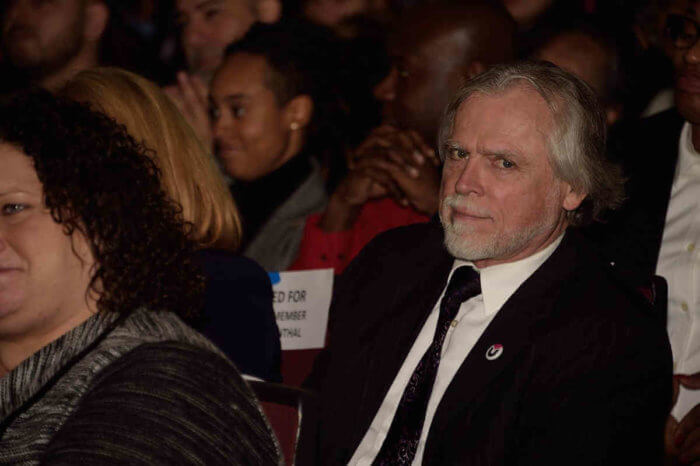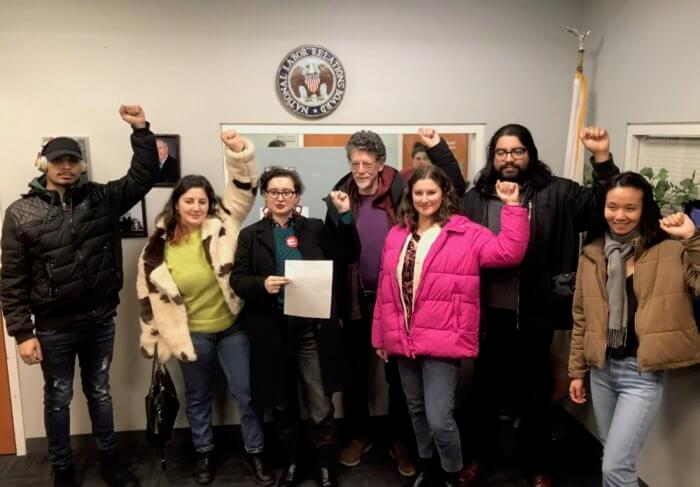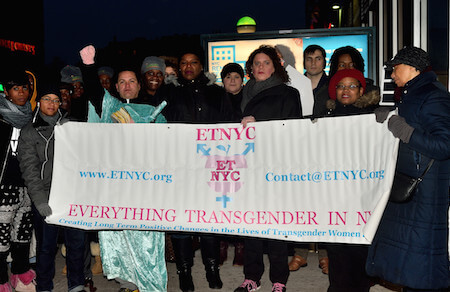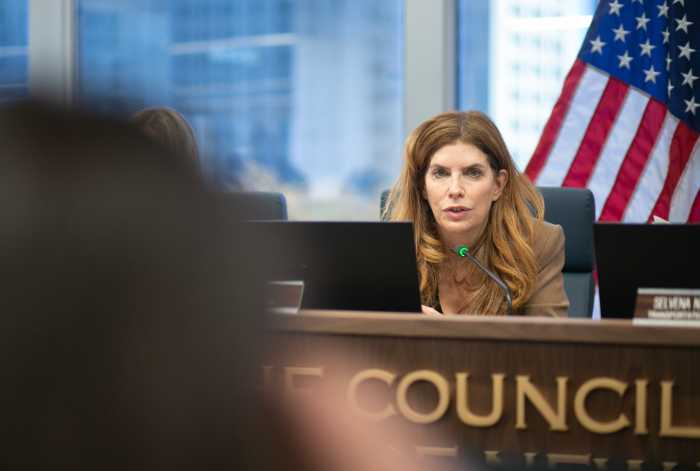Housing Works employees and the union seeking to represent them are expressing anger over the ongoing resistance of the non-profit’s out gay CEO, Charles King, a man who they say has drifted from his radical activism to become a union-busting boss. The rift comes as the agency is in its fifth month of contending with the coronavirus pandemic, a stretch that has witnessed significant staffing changes there.
The union proponents’ latest beef is with King’s appeal to the Washington headquarters of the National Labor Relations Board (NLRB), where employees believe their efforts are viewed less favorably by Donald Trump appointees than they are in the federal agency’s Brooklyn district office.
The Housing Works organizing group, represented by the Retail, Wholesale and Department Store Union (RWDSU), has spent months trying to advance their effort at unionizing, complaining of shoddy health insurance plans, high caseloads, a meager paid time-off policy, and more. RWDSU and some Housing Works employees say the battle represents an ironic twist at a non-profit that has spent decades preaching progressive causes while serving clients with HIV/ AIDS experiencing homelessness.
Workers stormed off the job last October and held a rally at Brooklyn’s Borough Hall, where folks heard testimonials from employees like Siobhán Fuller, a transgender woman who explained that her agency health insurance plan included a high deductible that forced her to shell out hundreds of dollars for necessary hormones as well as a $100 bill for every doctor appointment.
Earlier this year, King argued that such complaints about co-pays failed to note that Housing Works carries secondary insurance covering up to $50 of any co-pay, and that for services provided at the agency’s clinics or affiliated pharmacies co-pays are waived altogether. On that point, the union responded that, even with the first $50 in co-pays covered, employees face between $15 and $45 in out-of-pockets to see a specialist, depending on which of the agency’s three healthcare plans they choose.

Workers seeking the union said they were stonewalled by King, who wouldn’t accept their neutrality agreement. In February, they filed for an election through the NLRB and the ballots were slated to be mailed out on March 20. One day before that, the NLRB postponed elections because of the pandemic.
The federal agency resumed elections in April, and in May Housing Works and the union unsuccessfully sought to navigate an agreeable path forward. The agency wanted to include its new COVID-19 “isolation shelters” in the bargaining unit, but the union pushed back because the shelters did not exist at the outset of the election process and employed workers who didn’t petition for the election, according to RWDSU.
Finally, on July 9, the Brooklyn-based NLRB office ruled that the election should move forward. Ballots were set to be mailed out on July 31, but on July 23 Housing Works stepped in with an appeal to the NLRB’s Washington office, which again postponed the election.
In comments to Gay City News last week, King acknowledged the conflict between the two sides, explaining that their differences stem in part from staffing changes brought about by the pandemic’s arrival.
“We’ve obviously had some significant changes in our staffing so we want to renegotiate the proposed bargaining unit to eliminate people who are no longer part of our staff and add people who are part of our staff,” he said.
Some people who were previously in the bargaining unit had moved to different jobs, such as working in the isolation shelters and would be ineligible to vote, he said.
The union dismissed King’s argument, arguing that many of those who shifted to new jobs had been promoted to management posts and would be ineligible for union membership anyway. If any such worker inadvertently received a ballot, their vote could be set aside as a “challenge” ballot.
But King asserts that the union’s position ignores the operational restructuring Housing Works was required to undergo in order to sustain itself and meet its clients’ needs.
“The issue the NLRB is currently reviewing is whether there have been changed or unusual circumstances that warrant updating or revising the election agreement — surely a global pandemic, coupled with the massive shift in operations, would qualify,” he said.
In a response on August 7, King reiterated his view that employees working in the isolation shelters shouldn’t be excluded from the vote.
“From the beginning, the RWDSU wanted to organize Housing Works staff as one bargaining unit that included everyone from the thrift stores to the supportive housing — we are simply ensuring that every employee is included,” he said.
Regarding employees who were furloughed or laid off in the wake of the pandemic, King asserted that “every single person who Housing Works laid off” was offered “alternative positions.”
“That is just not true,” RWDSU’s out gay president, Stuart Appelbaum, told Gay City News.
Appelbaum and current and former agency employees allege that its behavior regarding furloughs and rehiring reflect an ongoing effort at union-busting by Housing Works and their attorneys at Seyfarth Shaw LLP.
“The bottom line is this: Every time workers at Housing Works have tried to demonstrate the overwhelming support the union has, Charles King has fought any effort to let his members have a voice,” Appelbaum said. “Time after time. It’s been consistent. Always with a different excuse.”
Eric Fretz, a former Housing Works thrift shop employee, said he was furloughed on April 2 for a period intended to be four months, but then received a note in May saying he was permanently laid off.
“The weird thing about that email was they said they decided to reorganize the bookstore, and because of that my position was being eliminated,” Fretz recalled. “I said, ‘Wait a minute. I didn’t work in the bookstore.’ They came back with no explanation of why.”
Fretz applied for other positions, but was rejected — and he wonders whether his involvement in the union drive was a factor in his termination.
“It’s certainly what I suspect,” he said. “They knew I was involved in this. They haven’t come back with an explanation why. They said I was doing a really good job and that the neighborhood adored me.”

Fretz, a former member of ACT UP, added, “I didn’t know Charles very well, but his reputation was good and we marched with him at Pride. It’s supposed to be a progressive organization, but they’re constantly misleading staff about what’s happening… I lost a lot of respect for Housing Works and especially for King.”
Fretz added that he “absolutely” believes the reason why the organization has turned to the NLRB’s Washington office was because of the anti-union sympathies Trump appointees there harbor.
Venitia Boyce, a former Housing Works peer navigator, said she received a vague email on March 30 asking her to check in with a director at her office. She was assured that everything was fine and that the agency merely wanted to check in on how she was handling working from home.
“When I hopped on the call, they said, ‘Sorry, you’re being permanently let go,’” Boyce recalled, noting that the agency pointed to the pandemic and budget cuts as reasons why she was laid off.
“It was weird because I was one of the most senior folks there and definitely the most senior navigator,” she said. “They said ‘Feel free to apply to any other job.’” Like Fretz, she was not offered any other position in the organization.
Boyce said that when she first arrived at Housing Works she was forced to take on a caseload of 80 clients, which she said was at least 25 more than the recommended amount. She also recalled a workplace culture of friction between management and the workers on the ground.
“The level of disrespect coming from management became more apparent,” she said. “Housing Works really champions how they’re good at organizing, but when it comes to workers actually organizing on behalf of themselves, it becomes a problem.”
David Ngo, a case manager technician still employed by Housing Works, said he has felt a sense of unity among staff members during the union push. He appreciated that because, in his view, Housing Works management has not actively listened to workers’ perspectives.
“I’m at a loss of words,” he said. “They make us seem like we’re the aggressors invading their company. They’re saying one thing, but in reality they want to start over from the beginning.”
Appelbaum echoed the astonishment voiced by Housing Works employees who point to a shift in King, from a champion protesting injustice and fighting for marginalized communities to an employer hostile to his workers mounting a union drive.
“It is so sad and disappointing to see someone who once had a reputation as a radical morph into a union-busting, anti-union employer turning to the Trump labor board,” Appelbaum said.
The union is awaiting the next move by the NLRB’s DC office. On July 29, the NLRB ordered a stay of the election as it considers undertaking the review Housing Works seeks, according to RWDSU. Appelbaum complained about Washington NLRB officials inserting themselves into the issue after “the Brooklyn director saw that there was no validity to [King’s] arguments and wanted mail ballots to go out.”
“[King] comes up with all sorts of excuses, just like Donald Trump,” Applebaum said. “It’s amazing to see how similar they’ve been in trying to discredit elections.”
King reacted with irritation when told of Appelbaum’s comment.
“Comparing an organization that has spent 30 years serving and fighting for the health and safety of our communities to a president who has spent the last four years undermining them is truly unconscionable,” he shot back. “In fact, this issue is only in front of the NLRB because the RWDSU brought it to them months ago.”
Applebaum concluded, “I would say this: That each member of the board of directors of Housing Works needs to be held responsible for the union-busting activity of Charles King.”
Additional reporting by Duncan Osborne. To sign up for the Gay City News email newsletter, visit gaycitynews.com/newsletter.















